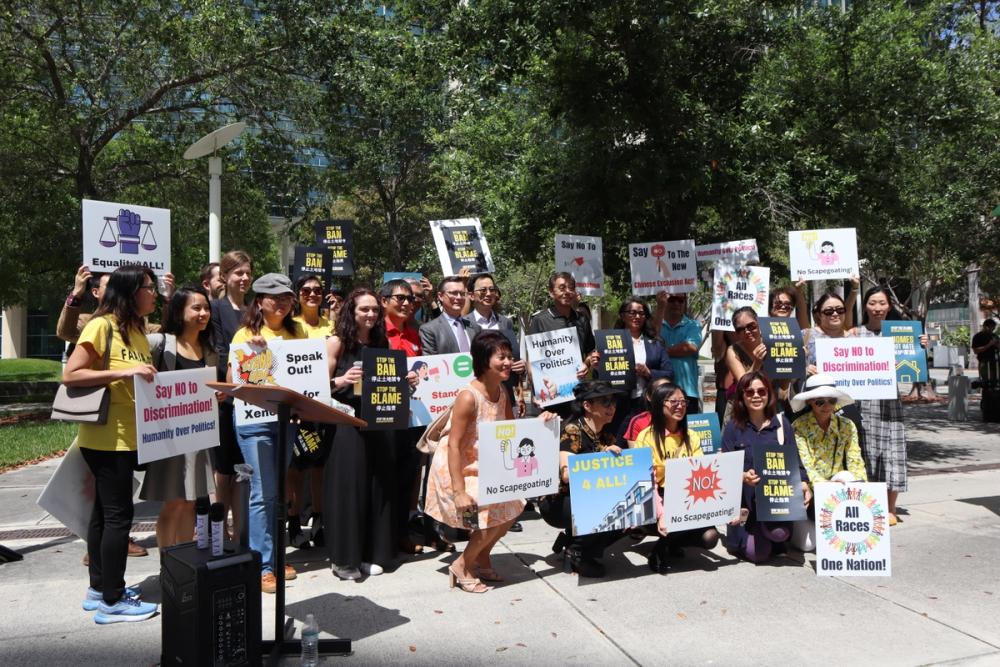Press Release
Chinese Immigrants Urge Appeals Court to Block Florida’s Discriminatory Housing Law

MIAMI, FL— Today, the U.S. Court of Appeals for the 11th Circuit will hear arguments in Shen v. Simpson, a lawsuit challenging SB 264 — the Florida law that bans many Chinese immigrants, including people here lawfully as professors, students, employees, and scientists, from buying a home in large swaths of the state.
A similar but less restrictive rule also applies to many immigrants from Cuba, Venezuela, Iran, North Korea, Russia, and Syria. However, the law singles out people from China for especially draconian restrictions and harsher criminal penalties, including up to five years in prison for the person trying to buy a home, up to one year in prison for the seller, as well as thousands of dollars in fines.
“By putting huge parts of the state off-limits to people who simply want to buy a home, this law expands discrimination against people of Asian descent,” said Patrick Toomey, deputy director of ACLU’s National Security Project. “Discriminatory housing practices have long shaped who has access to quality education, health care, security, opportunity, and wealth, and this law is no different. We look forward to explaining to the court of appeals why this unconstitutional law must be halted.”
The American Civil Liberties Union, ACLU of Florida, DeHeng Law Offices PC, the Asian American Legal Defense and Education Fund (AALDEF), and the law firm Quinn Emanuel are representing four Chinese immigrants who live, work, study, and raise families in Florida, but are prohibited under SB 264 from buying a home, as well as Multi-Choice Realty, a local real estate firm whose business has been harmed by the law.
“Florida’s SB 264 is a relic from a long history of similarly racist land laws in this country that were wrong then and are wrong now,” said Bethany Li, legal director of the Asian American Legal Defense and Education Fund (AALDEF). “This law targets Chinese people in clear violation of the Constitution, and its chilling effect reaches even further, hurting all Asian Americans who call this country home.”
Earlier this year, the court of appeals barred enforcement of the law against two of the plaintiffs while the court considers and decides the merits of the appeal. In the ruling, a unanimous panel of three judges found it substantially likely that SB 264 conflicts with federal law. The plaintiffs are now asking the court to block the law more broadly as the case moves forward in the district court.
“We believe Florida is trampling on our clients’ rights to be free from discrimination, as well as undermining the federal government’s authority to set foreign policy and national security priorities,” said Derek Shaffer, partner at Quinn Emanuel. “We welcome the opportunity to present our case before the Eleventh Circuit.”
This pernicious law recalls repeated efforts over the past century to weaponize false claims of “national security” against Asian and other immigrants. In the early 20th century, politicians used similar justifications to pass “alien land laws” in California and more than a dozen other states, prohibiting Chinese and Japanese immigrants from becoming landowners.
“Florida was one of the last states to repeal its alien land law in 2018, and since then, has passed a multitude of xenophobic laws, like SB 264, that once again make it harder for Chinese immigrants to build a life in the state,” said Clay Zhu, attorney and managing partner at DeHeng Law Offices PC. “We cannot let Florida turn back the clock.”
After SB 264 was signed into law, Florida passed another law restricting public universities from employing international students from China and other “countries of concern” as graduate assistants. And around the country, politicians are introducing a wave of xenophobic legislation aimed at stopping land purchases by Chinese citizens and companies. At a time when more than one in two Asian Americans report feeling unsafe in the U.S. due to their ethnicity, laws like Florida’s raise widespread fears of harassment and violence.
“Florida is one of the most diverse states in our country and home to immigrants from across the globe,” said Daniel Tilley, legal director of the ACLU of Florida. “Floridians have been faced with an onslaught of discriminatory laws and deserve a government that upholds the principles of equity and justice.
###
For additional information, contact:
Stuart J. Sia, AALDEFssia@aaldef.org
Allegra Harpootlian, ACLUaharpootlian@aclu.org
